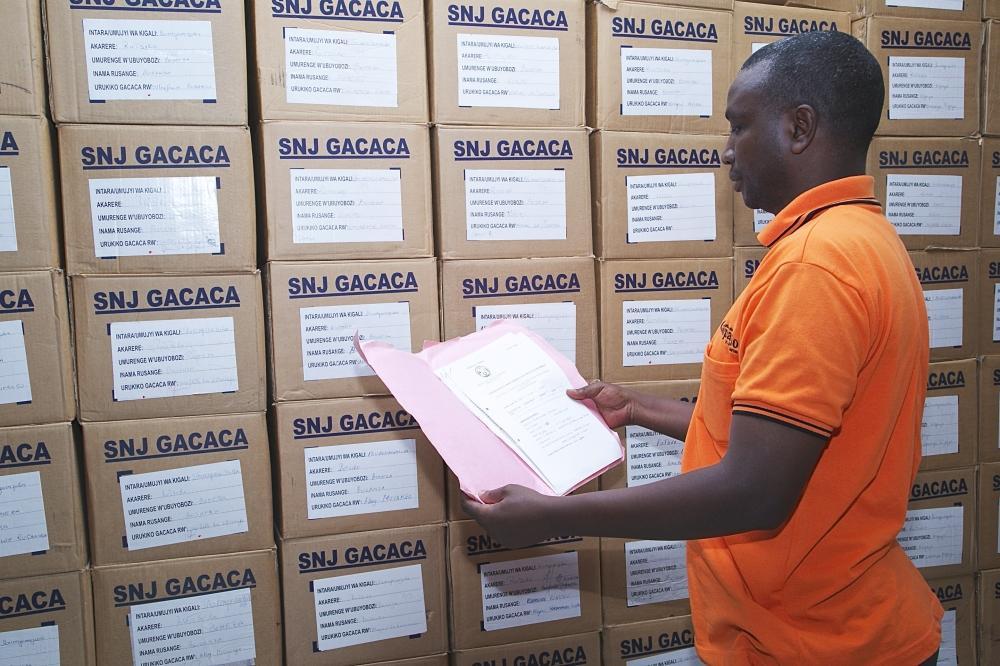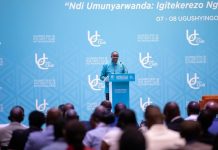Africa-Press – Rwanda. The Ministry of National Unity and Civic Engagement (MINUBUMWE) has announced that 40% of Gacaca Court archives have been indexed as part of efforts to preserve the history of the genocide and combat genocide denial.
This update was shared on April 3 during a press conference ahead of the 31st commemoration of the 1994 Genocide against the Tutsi, which will begin on April 7.
Following the 1994 Genocide against the Tutsi, during which over one million people were killed, Rwanda established the Gacaca Courts to address genocide-related crimes.
Gacaca was a homegrown, community-based justice initiative aimed at prosecuting perpetrators of the genocide.
The Gacaca system officially concluded in 2012 after trying over 1.9 million genocide-related cases over the course of 10 years.
At present, at least 48 million copies of the archives, now in digital format, require indexing.
Indexing, a phase that follows digitisation, involves linking each file with identification details, including the name of the corresponding defendant, their district, sector, and cell of origin.
“All the archives were digitized. We had to follow up with indexing, which is currently at 40%. We were supposed to complete the indexing by 2024 but could not meet that target due to disruptions caused by the COVID-19 pandemic. We hope that the indexing will be completed by the end of this year (2025),” said Jean-Damascène Bizimana, the Minister of National Unity and Civic Engagement.
Efforts are also underway to have the Gacaca archives registered with the United Nations Educational, Scientific and Cultural Organization (UNESCO) Documentary Heritage Listing. A national committee is assessing and identifying significant historical, cultural, and documentary heritages for potential inclusion on the world’s heritage list.
Preservation for future generations, scholars and historians
The Gacaca Courts dealt with some of the most traumatic events in Rwanda’s history.
Digitising these records is vital for preserving them for future generations, according to the Ministry of National Unity and Civic Engagement (MINUBUMWE).
Digitization and indexing are necessary because paper records are vulnerable to environmental factors, such as fires, floods, or physical degradation.
In contrast, digital records can be stored and backed up in multiple secure locations.
This process allows scholars, historians, and future generations to study and understand Rwanda’s journey toward reconciliation, justice, and healing.
Accessibility and transparency
Digitizing Gacaca Court records facilitates easier access to case files and judgments, benefiting both individuals involved in the trials and legal authorities.
It reduces reliance on physical archives, which can be difficult to navigate and are prone to damage or loss.
Legal professionals can quickly retrieve case information, track progress, and manage cases without spending time on paper-based processes.
When Gacaca Court records are digitized, they can be made publicly accessible, ensuring transparency in the justice system.
Preserving Testimonies
Bizimana emphasized the importance of preserving testimonies related to the Genocide against the Tutsi.
“Some people with crucial testimonies about the genocide die, and their testimonies disappear. Yet, these are vital for future generations,” he explained.
The Gacaca Courts were unique in involving the community in the judicial process, with many testimonies from victims and perpetrators being heard publicly.
Digitization allows these powerful personal stories to be preserved, creating a permanent, verifiable record of the genocide and its aftermath, which can contribute to reconciliation efforts.
Holding perpetrators accountable
Some genocide perpetrators were tried in absentia by the Gacaca Courts, as they had fled the country and remained at large in foreign nations, according to Bizimana.
The National Public Prosecution Authority (NPPA) reports that out of the 1,147 indictments issued since 2007 and sent to 33 countries, only 62 fugitives have been apprehended and tried.
Of these, 50% were extradited to Rwanda for trial, while the remaining 50% were tried in the countries where they were arrested.
“The digitization of the Gacaca Courts can help ensure that those responsible for atrocities are held accountable by providing accessible, detailed records of each case. It also serves as a reminder of the importance of justice in healing societal wounds,” said Bizimana.
Shaping global discussions
Digital records can be shared with international courts, researchers, and human rights organizations, helping integrate Rwanda’s efforts into global discussions on justice, genocide prevention, and reconciliation.
It also fosters a greater understanding of the unique role the Gacaca Court system played in Rwanda’s post-genocide recovery.
Experts say that scholars and justice system professionals from around the world can compare Gacaca with other justice systems (e.g., the International Criminal Tribunal for Rwanda) to assess effectiveness, outcomes, and lessons learned.
Education
Through the digital archives of the Gacaca Courts, schools, universities, and public institutions can use the data to educate citizens about the past, reconciliation, and justice. This helps prevent history from repeating itself and promotes a deeper understanding of the genocide’s impact on Rwandan society.
For More News And Analysis About Rwanda Follow Africa-Press






